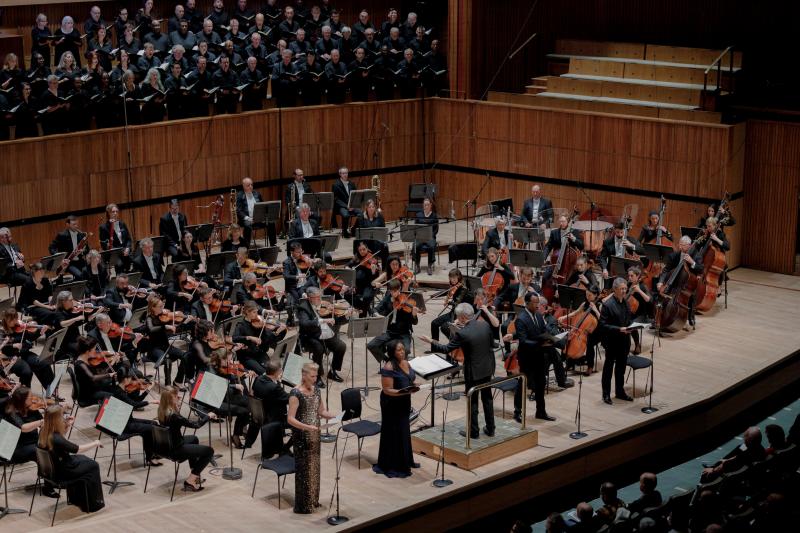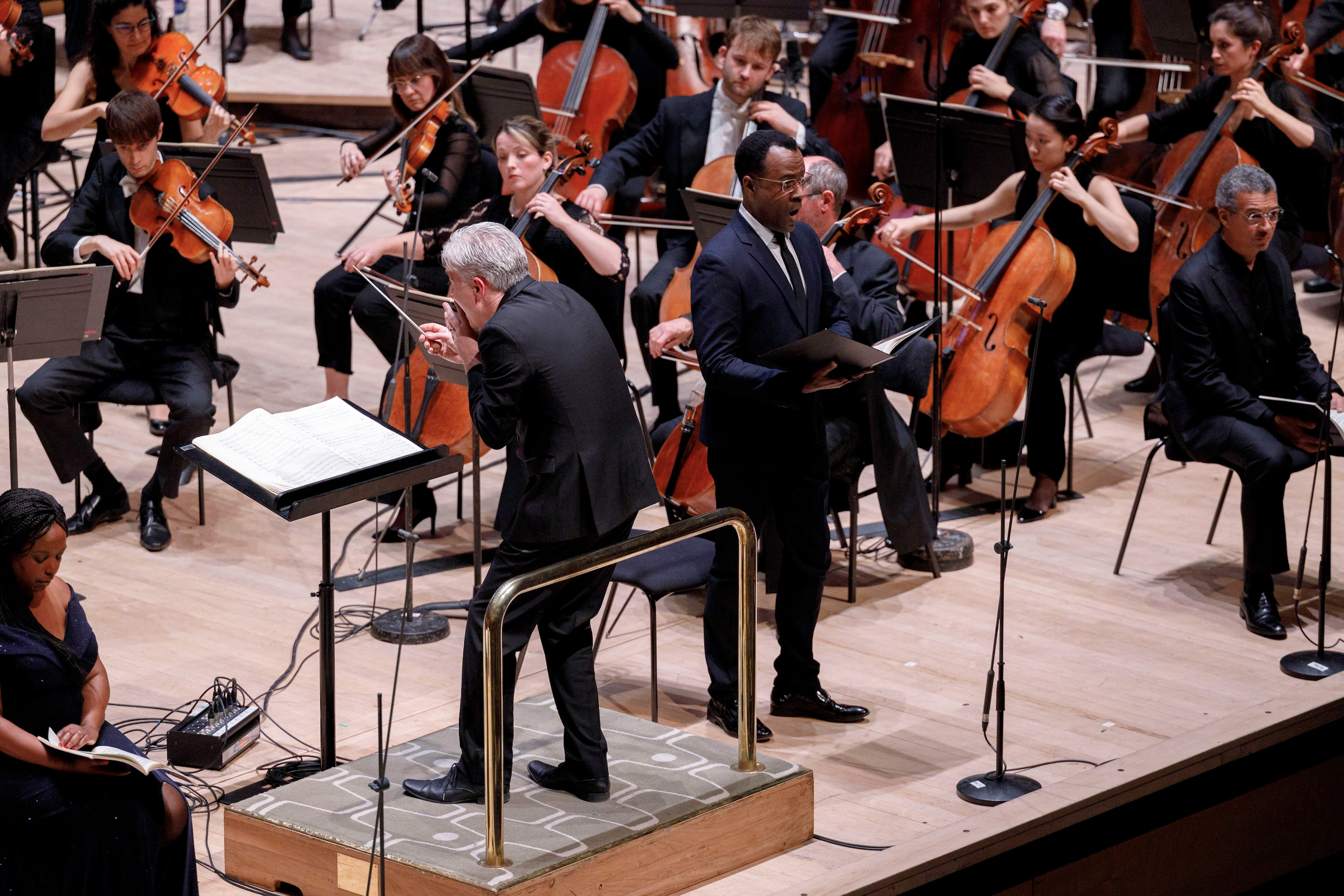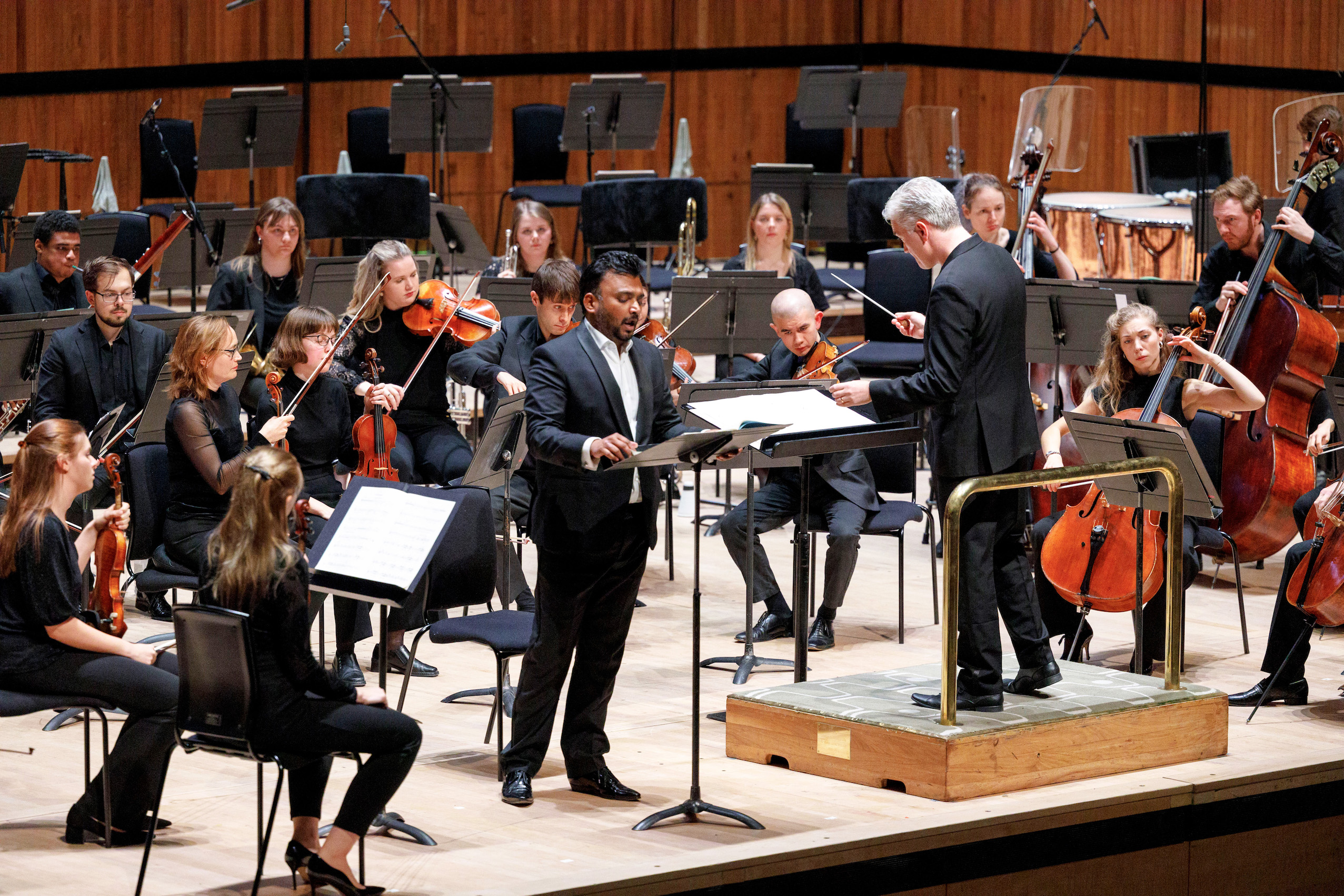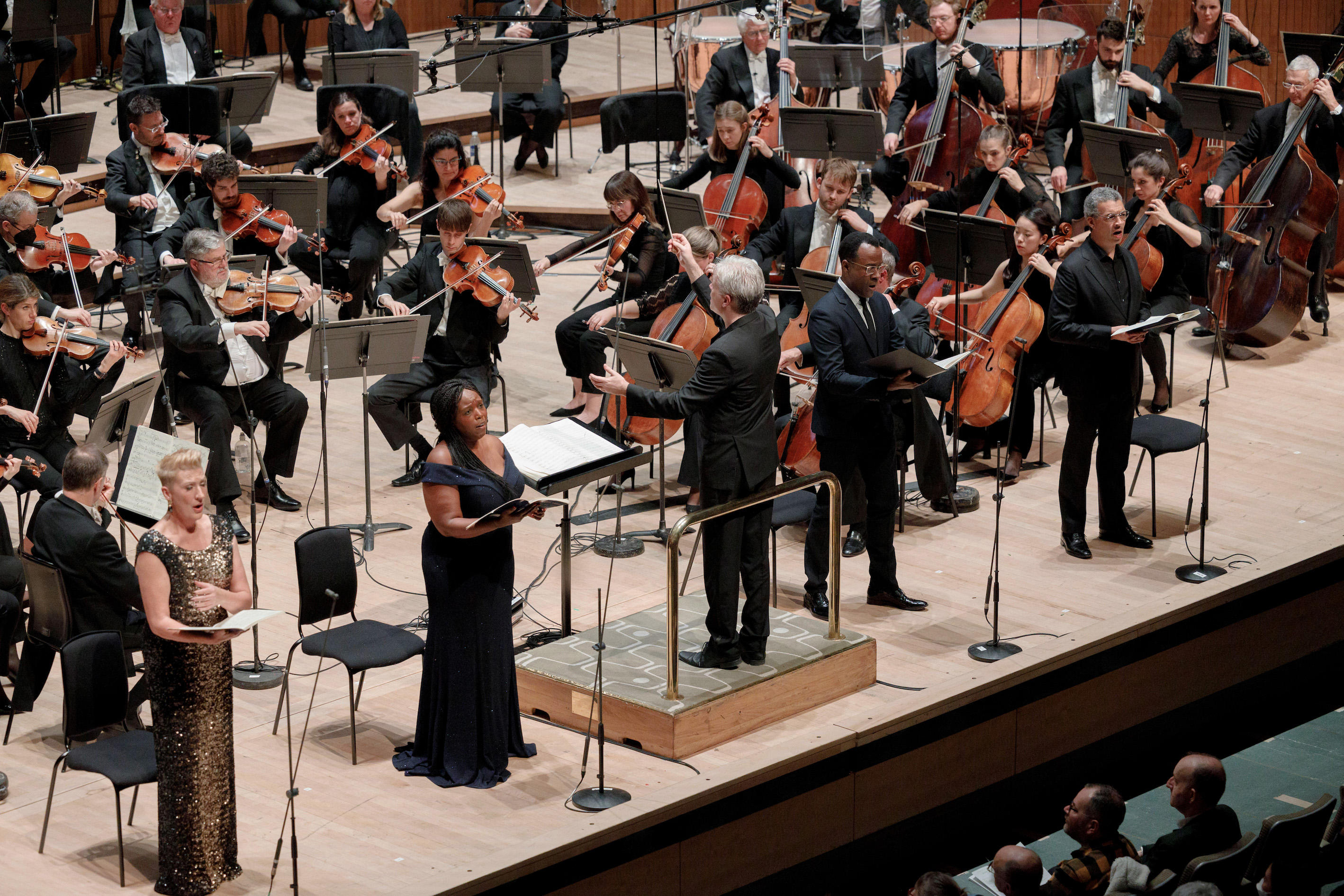A Child of Our Time, LPO, Gardner, RFH review - the spirit still moves | reviews, news & interviews
A Child of Our Time, LPO, Gardner, RFH review - the spirit still moves
A Child of Our Time, LPO, Gardner, RFH review - the spirit still moves
With forces of this calibre, Tippett's 'modern oratorio' retains its power

Half a century ago, Michael Tippett’s A Child of our Time felt inescapable. For a youth-choir singer in the London of that period, his wartime “modern oratorio” supplied a reference-point of ambition and achievement to which our exasperated elders always seemed eager to refer – and to defer.
Later, if it never quite vanished, Tippett’s epic updating of the sound-world of Messiah and the Bach Passions to dramatise 20th-century tyranny, persecution and revolt slipped into relative neglect.
The five African American spirituals that anchor it began to look suspiciously like “cultural appropriation”, while the Jungian psychology that frames Tippett’s text – with its overarching conflict between “light” and “shadow” – drifted further into the dippy New Age fringe. Though if we start to cancel pieces on those grounds…. no more Magic Flute?
Edward Gardner, always a charismatic advocate for wide-screen choral blockbusters, has never lost his faith in the work. On Saturday, at the Royal Festival Hall, he led the London Philharmonic Orchestra and Choir, the London Adventist Chorale and a quartet of first-rate soloists in a performance that thoroughly vindicated Tippett’s vision and music – if not every one of his words. Yes, the odd line in Tippett’s parable of repression and rebellion can fall flat – but since when did anyone fail to love Messiah (a presence behind so much of the Child) because of Charles Jennens’ weirdly stumbling verses?  In an extra, early-evening concert, Gardner (pictured above with Kenneth Tarver) – along with members of the LPO and students from the Royal Academy of Music – had explored the ideas of exile, displacement and refuge that underlie both Tippett’s work and the orchestra’s current season theme, “A place to call home”. MarK-Antony Turnage’s 2019 song-cycle Refugee was prefaced by a short work from the young Afghan composer Arson Fahim, who left to study in the US in 2021 just before the music-hating Taliban seized power again in his homeland. As a pizzicato cello sets out on its voyage, Journey to the Sea liltingly evokes the waters that bring danger as well as hope to those who dream of crossing them. Turnage’s settings, by turns bright, harsh and tender, employ varied poems by Emily Dickinson, WH Auden and Benjamin Zephaniah to remind listeners that a twist of history’s wheel may turn anyone into a despised wanderer. Tenor Amar Muchhala (pictured below) straddled their wide vistas of tone and feeling with vocal assurance and dramatic flair.
In an extra, early-evening concert, Gardner (pictured above with Kenneth Tarver) – along with members of the LPO and students from the Royal Academy of Music – had explored the ideas of exile, displacement and refuge that underlie both Tippett’s work and the orchestra’s current season theme, “A place to call home”. MarK-Antony Turnage’s 2019 song-cycle Refugee was prefaced by a short work from the young Afghan composer Arson Fahim, who left to study in the US in 2021 just before the music-hating Taliban seized power again in his homeland. As a pizzicato cello sets out on its voyage, Journey to the Sea liltingly evokes the waters that bring danger as well as hope to those who dream of crossing them. Turnage’s settings, by turns bright, harsh and tender, employ varied poems by Emily Dickinson, WH Auden and Benjamin Zephaniah to remind listeners that a twist of history’s wheel may turn anyone into a despised wanderer. Tenor Amar Muchhala (pictured below) straddled their wide vistas of tone and feeling with vocal assurance and dramatic flair.  Tippett, too, wanted to unite geopolitical tumult with the progress of an individual soul. After 1939, he sought to yoke his own quest for psychic wholeness with an understanding of the collective drives that had plunged his world into a genocidal hell. Doing so, he forged a verbal idiom that radiates an urgent, even rough-hewn integrity. You can see why the sympathetic TS Eliot advised the composer to write the libretto himself rather than solicit a commissioned script, from Eliot, that might boast more literary polish but put Tippett’s own imagination in the shade. And, with lines that invoke “Pogroms in the east, lynchings in the west” or the vindictive repudiation of refugees (“We cannot have them in our Empire. They shall not work, or draw a dole”), the composer's stark words match the climate of 2022 as well as 1944.
Tippett, too, wanted to unite geopolitical tumult with the progress of an individual soul. After 1939, he sought to yoke his own quest for psychic wholeness with an understanding of the collective drives that had plunged his world into a genocidal hell. Doing so, he forged a verbal idiom that radiates an urgent, even rough-hewn integrity. You can see why the sympathetic TS Eliot advised the composer to write the libretto himself rather than solicit a commissioned script, from Eliot, that might boast more literary polish but put Tippett’s own imagination in the shade. And, with lines that invoke “Pogroms in the east, lynchings in the west” or the vindictive repudiation of refugees (“We cannot have them in our Empire. They shall not work, or draw a dole”), the composer's stark words match the climate of 2022 as well as 1944.
Gardner and the LPO prefaced their Child with a short first half devoted to Vaughan Williams’s Serenade to Music, in its original form for 16 soloists (RVW’s setting of lines from The Merchant of Venice was devised as a collective anniversary gift for Henry Wood in 1938). The four Tippett singers (Nadine Benjamin, Sarah Connolly, Kenneth Tarver, Roderick Williams) were joined by a dozen alumni of the Royal College of Music in a reading that combined a luxurious plushness of orchestral sound – silken in the strings, mellow in the brass – with some pointed and refined singing of the brief vocal parts. This melodious throng never sounded like a mob.
The Serenade made space for a shimmering calm before Tippett’s storm. That broke as snorting brass and yearning, Bachian strings accompanied the choral evocation of a violent, wintry world that “turns on its dark side”. Gardner’s mastery of the big-choir sound – with stupendous high-impact moments, but filigree detail as well – always impressed. Connolly lent menace as well as fervour to her warning that banished gods will return in blood and fire. Williams inhabited the storytelling, Evangelist role with all the burnished authority at his command.
In this opening part, soprano and tenor (Benjamin and Tarver) sing as suffering Everywoman and Everyman in a world of scarcity and fear. Both brought a warmth and pathos to roles that culminate in Benjamin’s formidable top notes as she cries out in her comfortless pain – a misery miraculously assuaged by the quiet advent of the choir with its first spiritual, “Steal away to Jesus”. These episodes, when the anonymous genius of an enslaved people arrives to rescue fretful modern individuals from their sorrows, have a spellbinding, spine-tingling grandeur. Their magic has not faded. It depends, though, on moments of well-drilled hush as much as fortissimo blasts. Gardner’s chorus spanned a huge dynamic arc with precision and panache.
Part II narrows down a general malaise into the story of the (unnamed) teenaged Jewish refugee, Herschel Grynszpan. His killing in Paris of a Nazi diplomat gave Hitler a pretext for Kristallnacht in November 1938. Grynszpan’s tragedy, as a scapegoat “child of our time” pushed into terrorism by despair, becomes an archetypal confrontation between light and darkness. It tempts Tippett into a few verbally portentous touches. His music, though, never loses its directness and humanity. Williams’s nobly-voiced narration kept us grounded before another spiritual (“Nobody knows the trouble I see”) intervenes to offer balm and healing. As in Bach’s Passions, the chorus must manage some lightning changes of emotional costume. They curse and spit chillingly as a refugee-baiting baying mob (“Burn down their houses! Beat in their heads!), but then switch to the overwhelming, redemptive dignity and anger of “Go Down, Moses”: an absolute show-stopper, beautifully executed. As the “Boy” and his Mother, Tarver and Benjamin humanised the fable with nuanced, expressive shaping of their lines. Meanwhile, the LPO’s keening strings and plangent woodwinds channel the “dark voices that rise like a flood”.
 In the third part (as in Messiah) narrative yields to contemplation, as winter slowly yields to spring. Growling, snarling brass plumb icy depths of cold but the strikingly woven counterpoint of the chorus begins to glimpse the “jewel” of rebirth. With generous, tautly directed vocal forces, supported here by the penetrating clarity of both Connolly and Williams, the impassioned agility of the music more than makes up for the occasional clunkiness of the words. Tippett gracefully summons Bach’s ghost for tender woodwind solos before his “General Ensemble” allows all four principals (pictured above) to transit from solitary searching to uplifting, integrated harmony. The soloists movingly converged but, inevitably, it fell to the choir to lead us to the gates of paradise. Their finale, “Deep river”, had the force of emotion, allied to finesse of execution, that these borrowed spirituals need in order to avoid any whiff of Victorian sentimentality. Gardner, with all his voices, had amply confirmed that Tippett’s forlorn child can still speak to, and of, our time.
In the third part (as in Messiah) narrative yields to contemplation, as winter slowly yields to spring. Growling, snarling brass plumb icy depths of cold but the strikingly woven counterpoint of the chorus begins to glimpse the “jewel” of rebirth. With generous, tautly directed vocal forces, supported here by the penetrating clarity of both Connolly and Williams, the impassioned agility of the music more than makes up for the occasional clunkiness of the words. Tippett gracefully summons Bach’s ghost for tender woodwind solos before his “General Ensemble” allows all four principals (pictured above) to transit from solitary searching to uplifting, integrated harmony. The soloists movingly converged but, inevitably, it fell to the choir to lead us to the gates of paradise. Their finale, “Deep river”, had the force of emotion, allied to finesse of execution, that these borrowed spirituals need in order to avoid any whiff of Victorian sentimentality. Gardner, with all his voices, had amply confirmed that Tippett’s forlorn child can still speak to, and of, our time.
rating
Explore topics
Share this article
The future of Arts Journalism
You can stop theartsdesk.com closing!
We urgently need financing to survive. Our fundraising drive has thus far raised £49,000 but we need to reach £100,000 or we will be forced to close. Please contribute here: https://gofund.me/c3f6033d
And if you can forward this information to anyone who might assist, we’d be grateful.

Subscribe to theartsdesk.com
Thank you for continuing to read our work on theartsdesk.com. For unlimited access to every article in its entirety, including our archive of more than 15,000 pieces, we're asking for £5 per month or £40 per year. We feel it's a very good deal, and hope you do too.
To take a subscription now simply click here.
And if you're looking for that extra gift for a friend or family member, why not treat them to a theartsdesk.com gift subscription?
more Classical music
 Kempf, Brno Philharmonic, Davies, Bridgewater Hall, Manchester review - European tradition meets American jazz
Bouncing Czechs enjoy their Gershwin and Brubeck alongside Janáček and Dvořák
Kempf, Brno Philharmonic, Davies, Bridgewater Hall, Manchester review - European tradition meets American jazz
Bouncing Czechs enjoy their Gershwin and Brubeck alongside Janáček and Dvořák
 Solomon, OAE, Butt, QEH review - daft Biblical whitewashing with great choruses
Even a top soprano and mezzo can’t make this Handel paean wholly convincing
Solomon, OAE, Butt, QEH review - daft Biblical whitewashing with great choruses
Even a top soprano and mezzo can’t make this Handel paean wholly convincing
 Two-Piano Gala, Kings Place review - shining constellations
London Piano Festival curators and illustrious friends entertain and enlighten
Two-Piano Gala, Kings Place review - shining constellations
London Piano Festival curators and illustrious friends entertain and enlighten
 Echo Vocal Ensemble, Latto, Union Chapel review - eclectic choral programme garlanded with dance
Beautiful singing at the heart of an imaginative and stylistically varied concert
Echo Vocal Ensemble, Latto, Union Chapel review - eclectic choral programme garlanded with dance
Beautiful singing at the heart of an imaginative and stylistically varied concert
 Scott, Irish Baroque Orchestra, Whelan, RIAM, Dublin review - towards a Mozart masterpiece
Characteristic joy and enlightenment from this team, but a valveless horn brings problems
Scott, Irish Baroque Orchestra, Whelan, RIAM, Dublin review - towards a Mozart masterpiece
Characteristic joy and enlightenment from this team, but a valveless horn brings problems
 Classical CDs: Voice flutes, flugelhorns and froth
Baroque sonatas, English orchestral music and an emotionally-charged vocal recital
Classical CDs: Voice flutes, flugelhorns and froth
Baroque sonatas, English orchestral music and an emotionally-charged vocal recital
 Kanneh-Mason, Britten Sinfonia, Shave, Milton Court - a grin and a big beaming smile
A pair of striking contemporary pieces alongside two old favourites
Kanneh-Mason, Britten Sinfonia, Shave, Milton Court - a grin and a big beaming smile
A pair of striking contemporary pieces alongside two old favourites
 theartsdesk at the New Ross Piano Festival - Finghin Collins’ musical rainbow
From revelatory Bach played with astounding maturity by a 22 year old to four-hand jazz
theartsdesk at the New Ross Piano Festival - Finghin Collins’ musical rainbow
From revelatory Bach played with astounding maturity by a 22 year old to four-hand jazz
 First Person: Manchester Camerata's Head of Artistic Planning Clara Marshall Cawley on questioning the status quo
Five days of free events with all sorts of audiences around Manchester starts tomorrow
First Person: Manchester Camerata's Head of Artistic Planning Clara Marshall Cawley on questioning the status quo
Five days of free events with all sorts of audiences around Manchester starts tomorrow
 Goldscheider, Brother Tree Sound, Kings Place review - music of hope from a young composer
Unusual combination of horn, strings and electronics makes for some intriguing listening
Goldscheider, Brother Tree Sound, Kings Place review - music of hope from a young composer
Unusual combination of horn, strings and electronics makes for some intriguing listening

Add comment